[Note: The photographs and videos in this article were taken by me during my visit to Sevastopol.]
During the past decade of conflict between Ukraine and Russia, the Crimean port of Sevastopol has played a central role.
During the third week of April, I visited Sevastopol for three days, hoping to gain a better understanding of why this city on the Black Sea has featured so prominently in the conflict.
Some historical context
Sevastopol is the largest city in Crimea and a major port. It has been an important naval base throughout its history. Since the city’s founding in 1783, it has been the key base for Russia’s Black Sea Fleet.
Sevastopol is now an open city, but was previously a closed city during the Cold War:
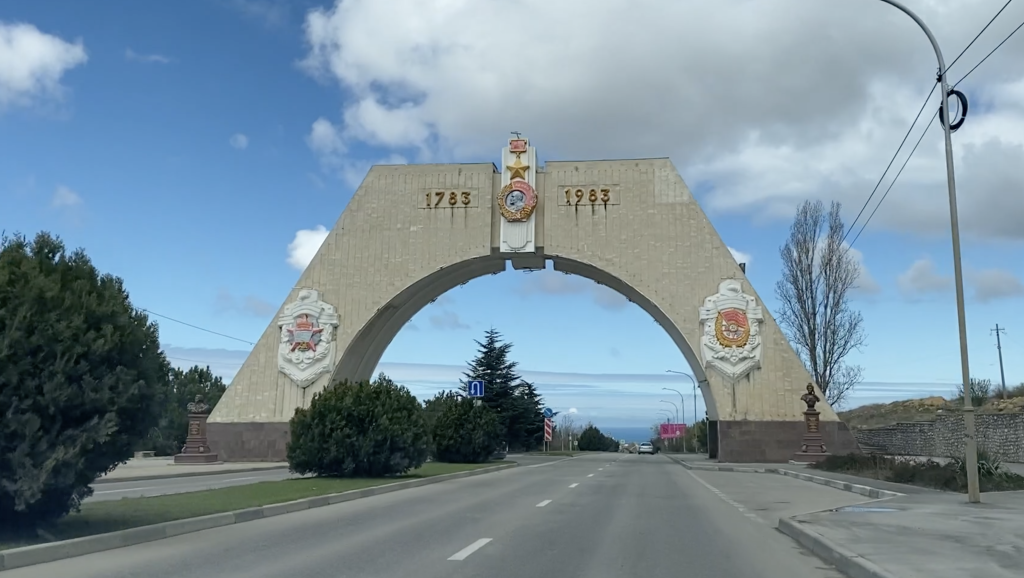
Entrance to Sevastopol
The name of Sevastopolis was originally chosen in the same etymological trend as other cities in the Crimean peninsula; it was intended to express its ancient Greek origins.
Empress Catherine II (“Catherine the Great”) of the Russian Empire founded Sevastopol in 1783:
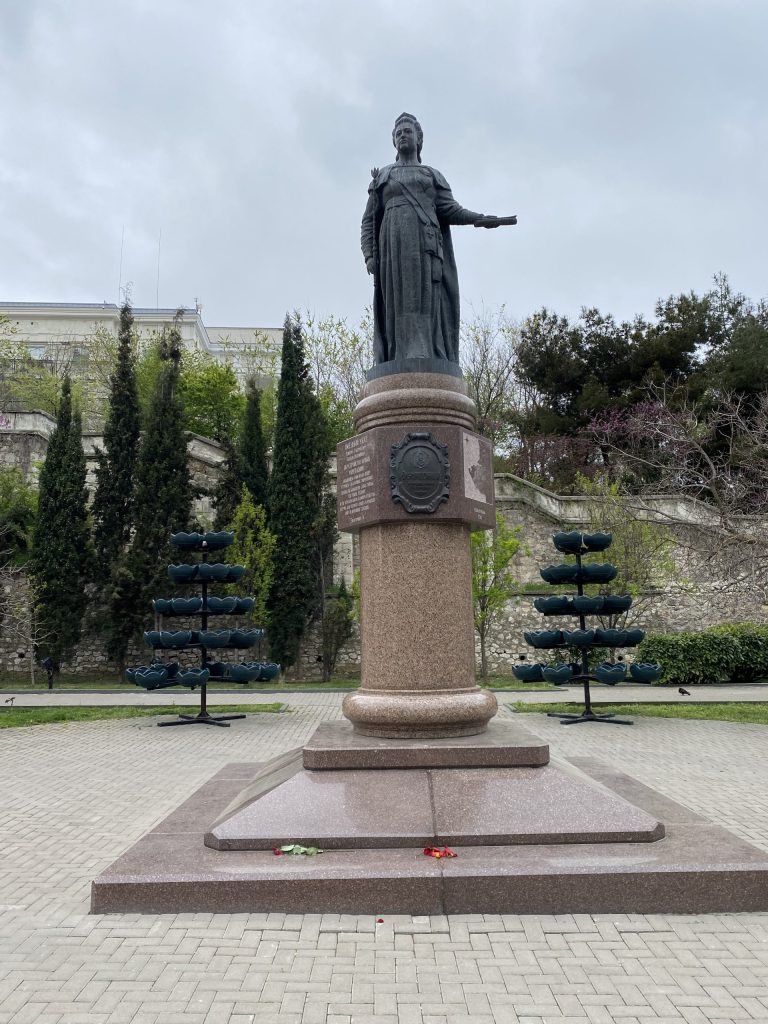
Statue of Catherine the Great in Sevastopol
In the west of the city, there remain well-preserved ruins of the ancient Greek port city of Chersonesos, founded in the 5th century BC by settlers from Heraclea Pontica. During my stay in Sevastopol, I visited these ruins:
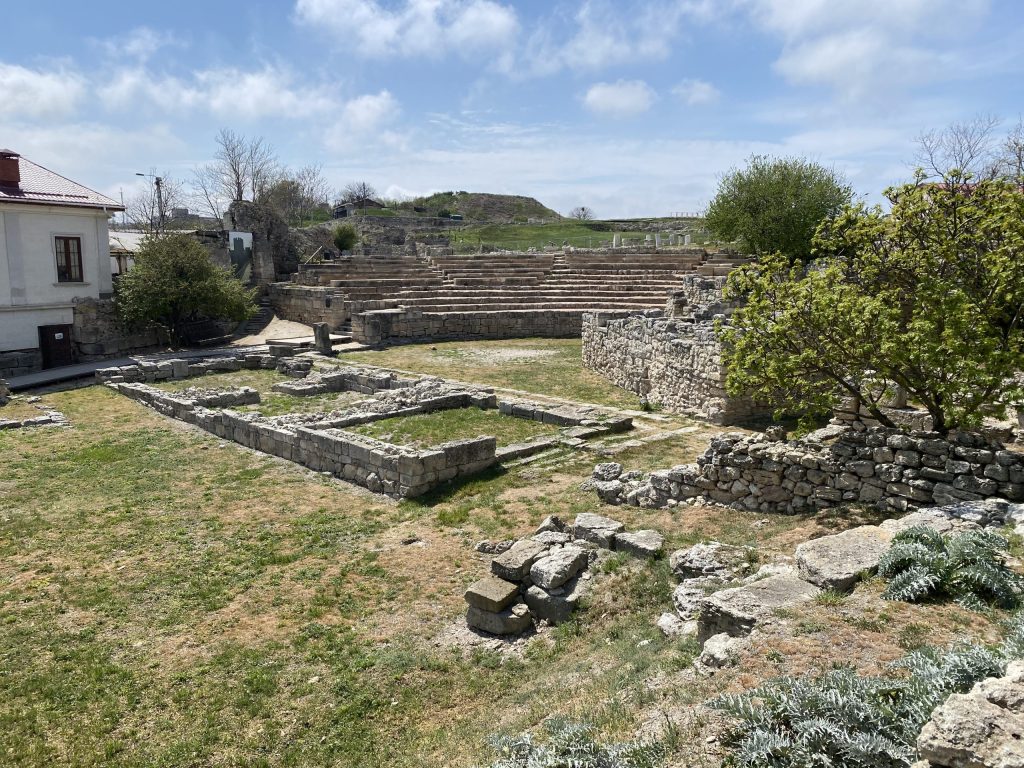
Amphitheatre of Chersonesos
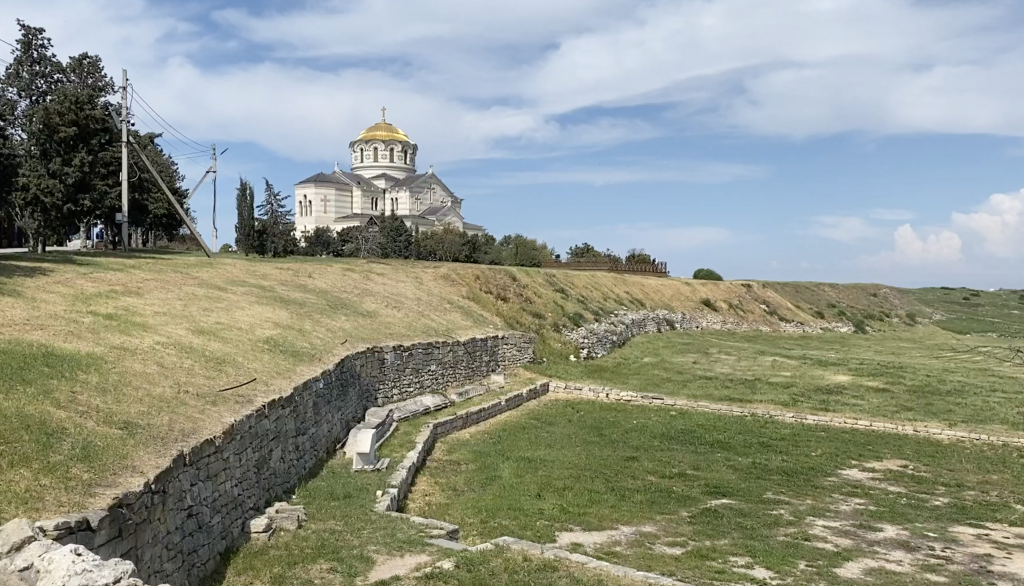
St. Vladimir’s Cathedral, overlooking the ancient ruins of Chersonesos
As the Center for Strategic and International Studies explained in 2014, control of Sevastopol ensured Russia’s access to a natural, warm-water port having extensive infrastructure and provided Russia with “important strategic defence capabilities.”
From 1948 onwards, Sevastopol enjoyed the status of a special city within the Russian Soviet Federal Socialist Republic, part of the Soviet Union.
Crimea was part of Russia from 1783, when Catherine the Great annexed it from the Ottoman Empire, until 1954. In 1954, the Soviet government, led by Nikita Khrushchev, transferred Crimea from the Russian Soviet Federation of Socialist Republics (RSFSR) to the Ukrainian Soviet Socialist Republic (UkrSSR). At the time, about 75% of Crimea’s population was ethnically Russian, while only 25% was ethnically Ukrainian.
Historians have struggled to understand why Khrushchev’s government effected the transfer. According to the Wilson Center, Khrushchev believed that adding Crimea’s ethnically Russian population to the UkrSSR would strengthen the Soviet government’s control over Ukraine.
Russia’s Black Sea fleet continued to be headquartered in Sevastopol after the collapse of the Soviet Union and the emergence of an independent Ukraine.
Under the Treaty on Friendship, Cooperation and Partnership signed by the Yeltsin government and Kiev in 1997, Russia recognized Sevastopol’s Ukrainian status and the inviolability of Ukraine’s borders, while Ukraine granted Russia the right to retain the Sevastopol naval base and to keep its Black Sea Fleet in Crimea until 2017.
A second agreement, signed in Kharkiv in 2010, extended the duration of the Russian Black Sea Fleet’s presence in Sevastopol till 2042. Russia paid Ukraine $98 million a year for leasing the naval base and granted Ukraine a discount on gas.
Then, in 2014, Ukrainian President Viktor Yanukovych was overthrown in a U.S.-backed coup. In 2010, international monitors had deemed Yanukovych’s election to have been free and fair. Throughout his term, Yanukovych sought to maintain good relations with the Russian Federation. Evidently, that was a bridge too far for the U.S. government and the European Union.
In the 2010 election, Yanukovych drew his support principally from oblasts in the southeast of Ukraine and Crimea, whose residents had relatively strong ties to Russia:
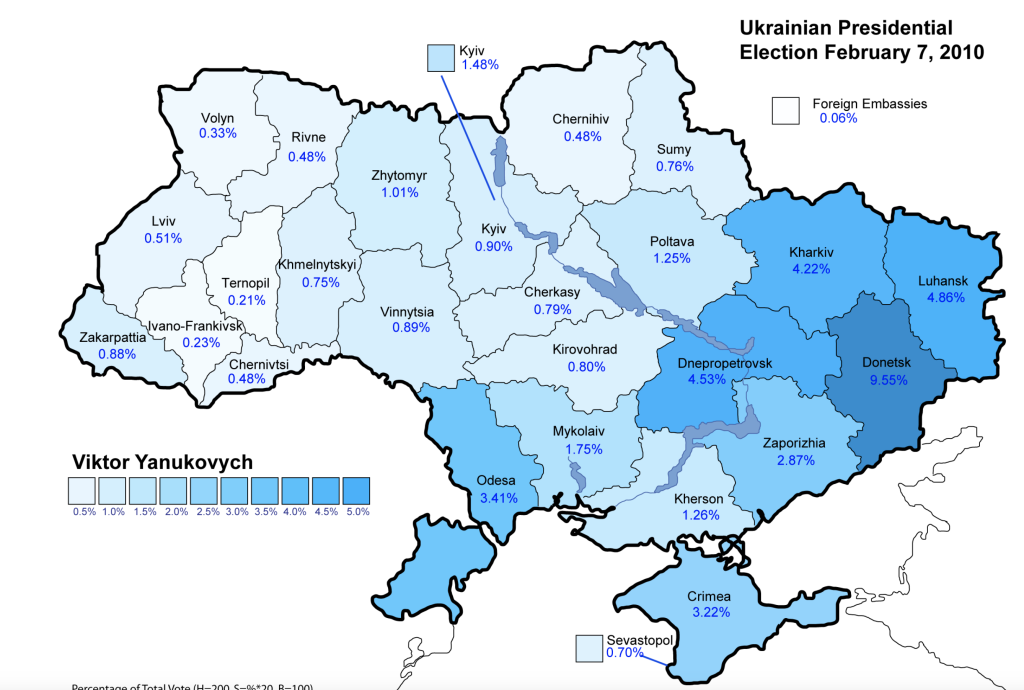
Ukraine 2010 Election – Distribution of Support for Viktor Yanukovych
While visiting Sevastopol and other parts of Crimea, I heard repeatedly from the people there that the overthrow of Yanukovych constituted a pivotal moment in relations between Crimea and Kyiv. The 2014 coup loomed large in my conversation with Sergei Pavlovich Gorbachev, a military correspondent and Chairman of the Sevastopol branch of Russia’s Union of Journalists. He and I spoke at length during my visit to Sevastopol. His complete interview is reproduced below, in the final section of this post.
From Yalta to Sevastopol
I travelled by car from Yalta to Sevastopol, along the majestic Black Sea coast of Crimea:
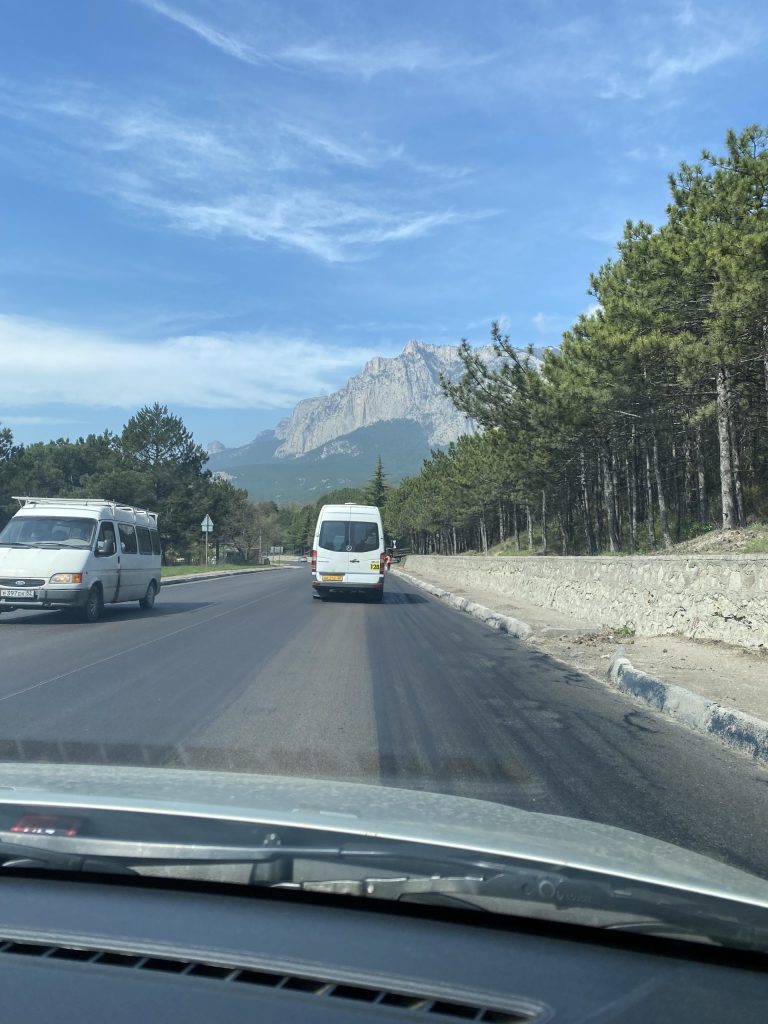
Highway between Yalta and Crimea, Black Sea Coast
Along that road, I encountered two sites of particular interest.
First, we passed by a hotel complex formerly owned by Ukrainian oligarch Ihor Kolomoisky:
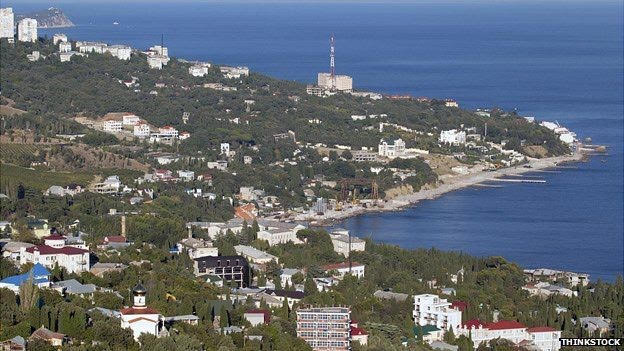
Hotel Complex in Crimea Seized from Ukrainian Oligarch Ihor Komoloisky
Kolomoisky is known to have funded Ukraine’s Neo-Nazi Azov Battalion. In addition, in January 2022, U.S. prosecutors filed civil forfeiture complaints alleging that Kolomoisky, who co-owned PrivatBank, one of the largest banks in Ukraine, embezzled and defrauded the bank of billions of dollars. In October 2021 – before Russia’s military intervention in Ukraine began – The Guardian reported:
Since entering politics Zelenskiy has been dogged by claims he is under the influence of Igor Kolomoisky, a billionaire whose TV channel screened Zelenskiy’s show. During the campaign Zelenskiy’s opponents alleged $41m from Kolomoisky entities found its way between 2012 and 2016 into offshore firms belonging to Zelenskiy and his circle, including Film Heritage.
Following Russia’s annexation of Crimea in 2014, Crimean authorities seized Kolomoisky’s luxurious hotel complex.
A few days before leaving Yalta to travel to Sevastopol, I visited another luxurious complex on the outskirts of Yalta, overlooking the Black Sea. There, before Russia’s annexation of Crimea, the Zelensky family owned a penthouse:
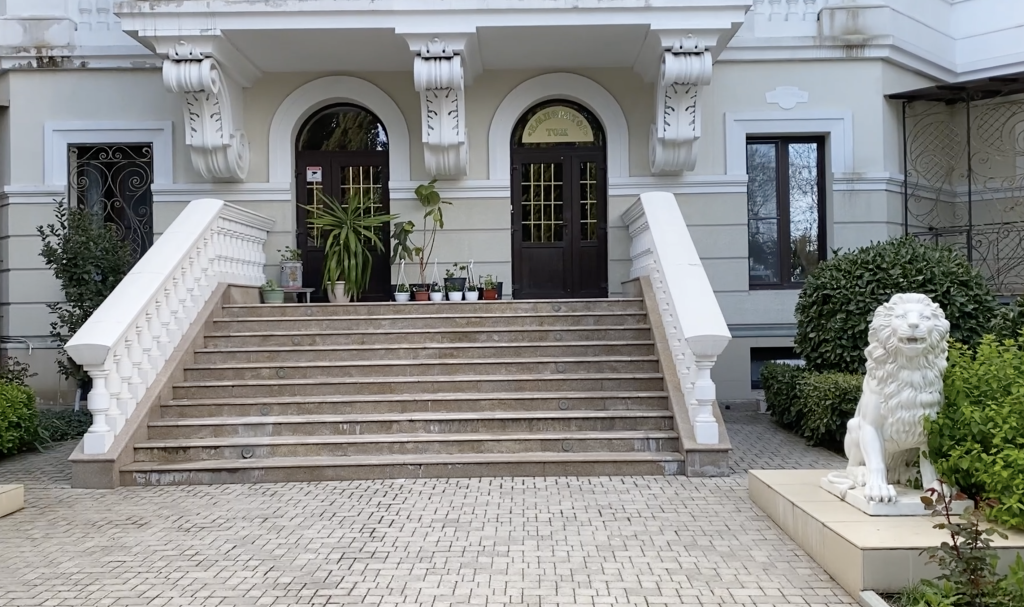
In 2019, Reuters reported that Zelensky’s wife bought the opulent penthouse from business tycoon Oleksandr Buryak for well under one-half the market rate. Before Reuters published its report on that transaction, neither Zelensky nor Buryak responded to questions from Reuters. Last year, Crimean authorities confiscated the Zelensky penthouse in retaliation for the seizure of Russian assets in Ukraine.
A second notable site which lies on the road from Yalta to Sevastopol is the Soviet-era submarine base in Balaclava. The base was decommissioned long ago, and now serves as a military museum. I toured the base for one hour, at a time when almost no one else was there.
Visitors to the submarine base enter the heart of the base through a long tunnel:
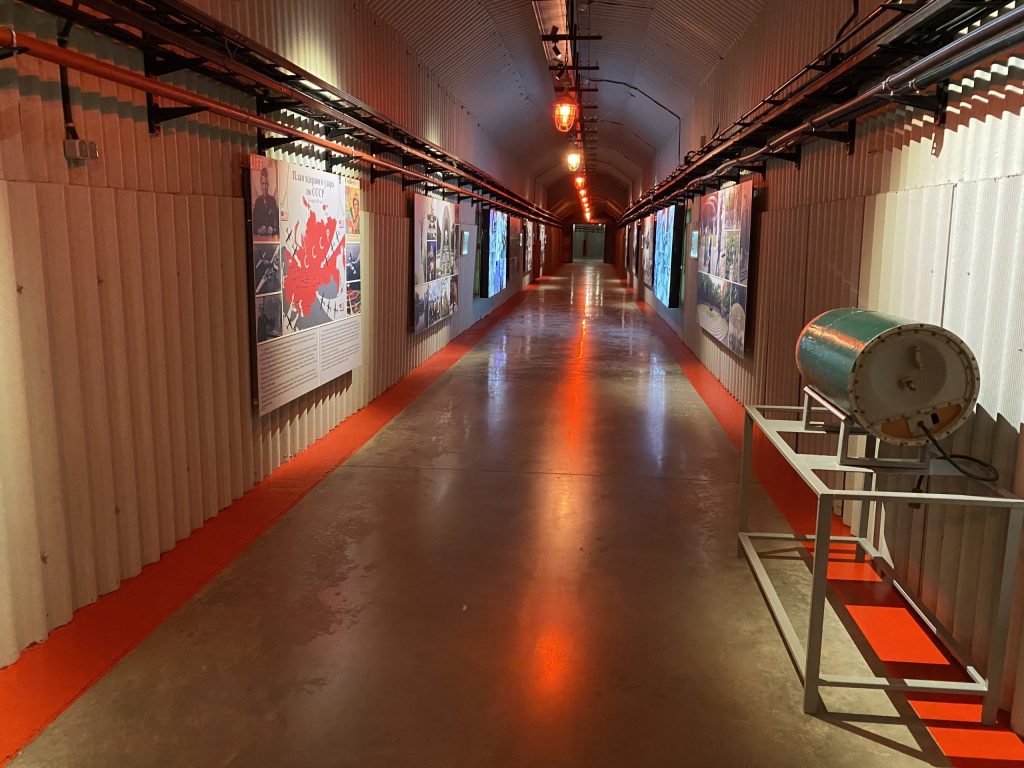
Tunnel into the heart of the Balaclava submarine base
The photographic exhibition at the military museum leaves no doubt as to who is responsible for the instigation of the nuclear arms race:
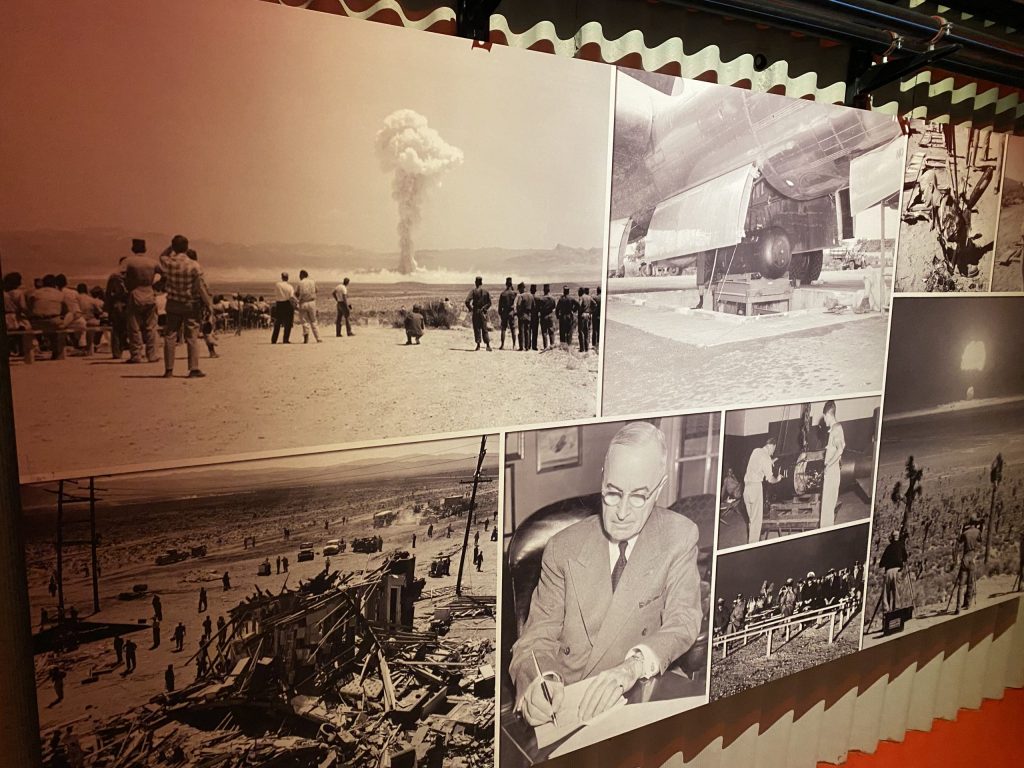
Photo Exhibition, Balaclava Submarine Base
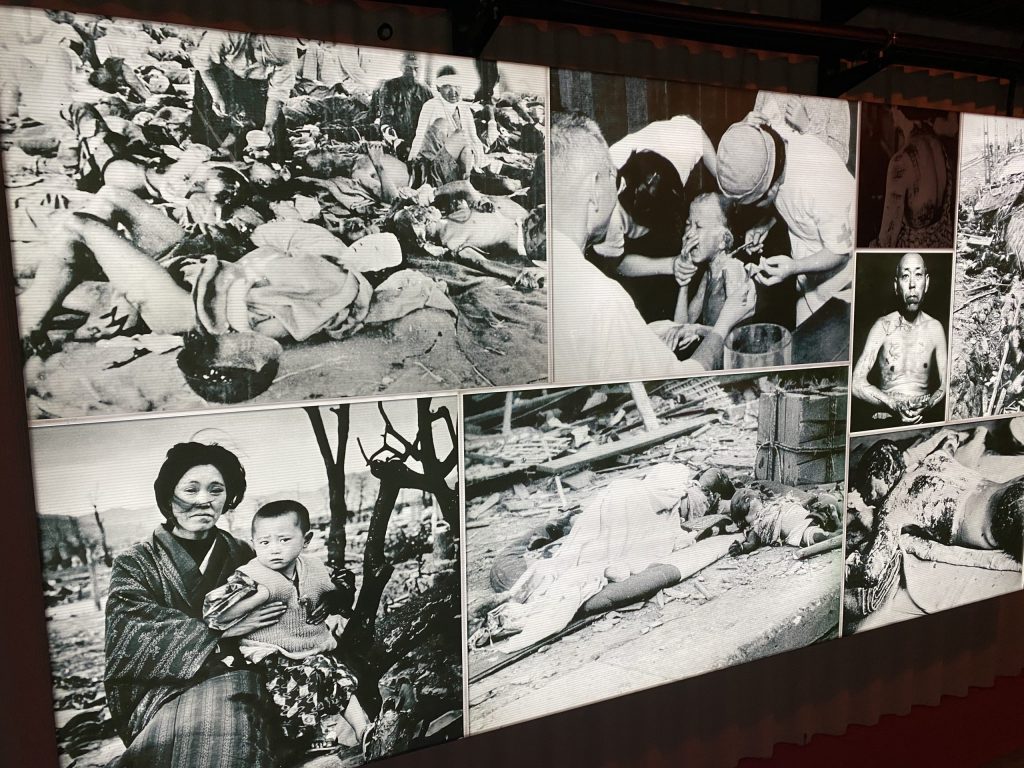
Photo Exhibition, Balaclava Submarine Base
The Balaclava military museum houses a decommissioned, diesel-powered, nuclear-armed submarine from the Soviet era:
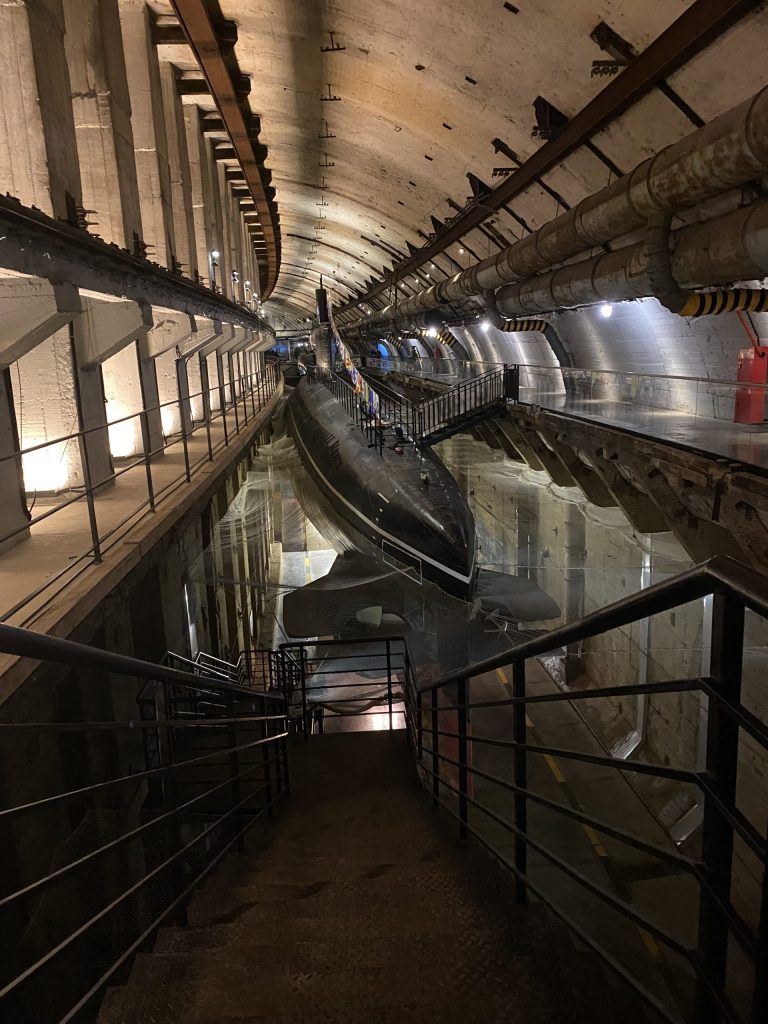
Decommissioned, diesel-powered submarine from the Soviet era
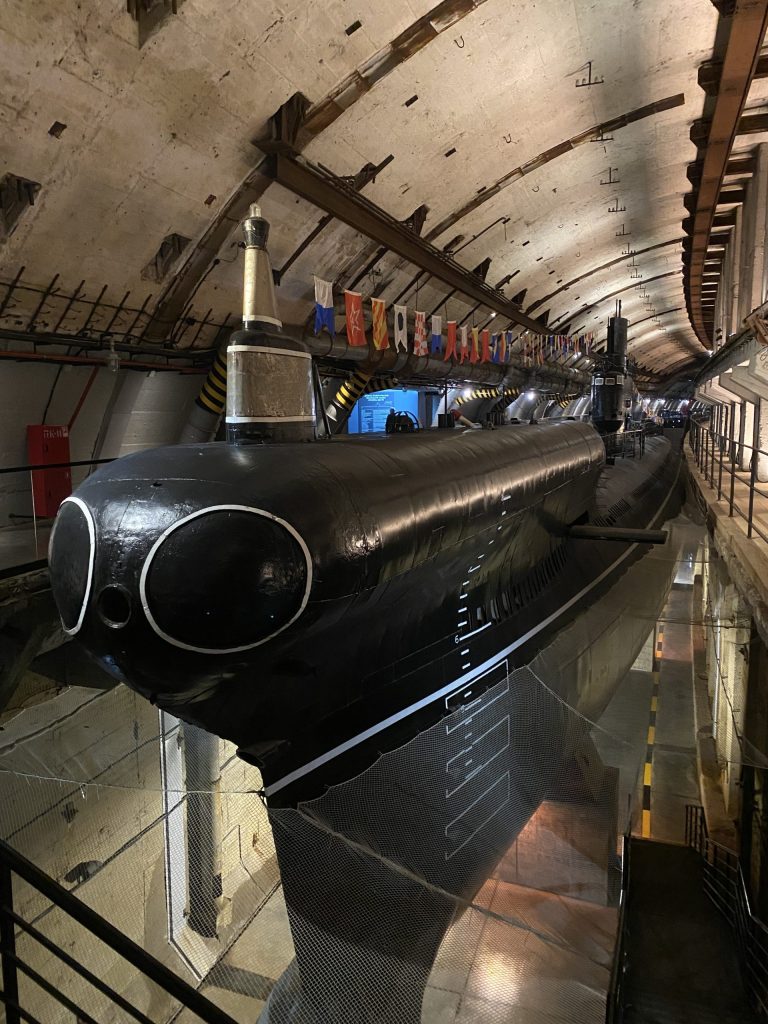
Decommissioned, diesel-powered submarine from the Soviet era
This canal was used for submarine repair at the base. The canal was encased in massive, concrete walls, to protect it from a nuclear strike:
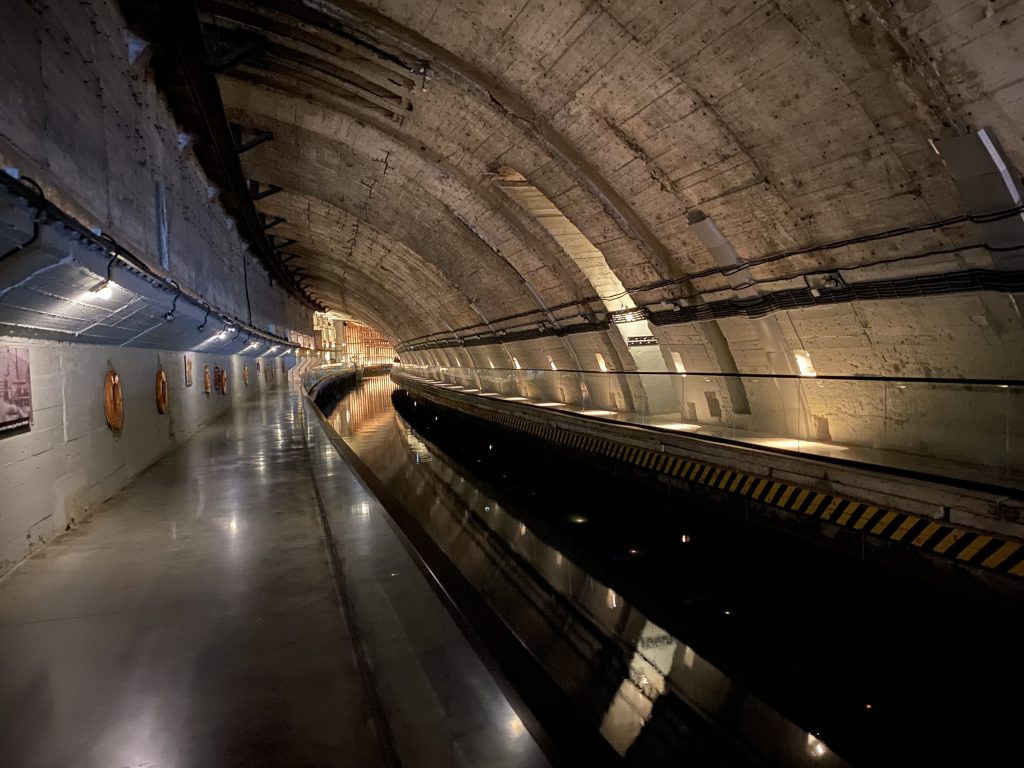
Canal for Submarine repair
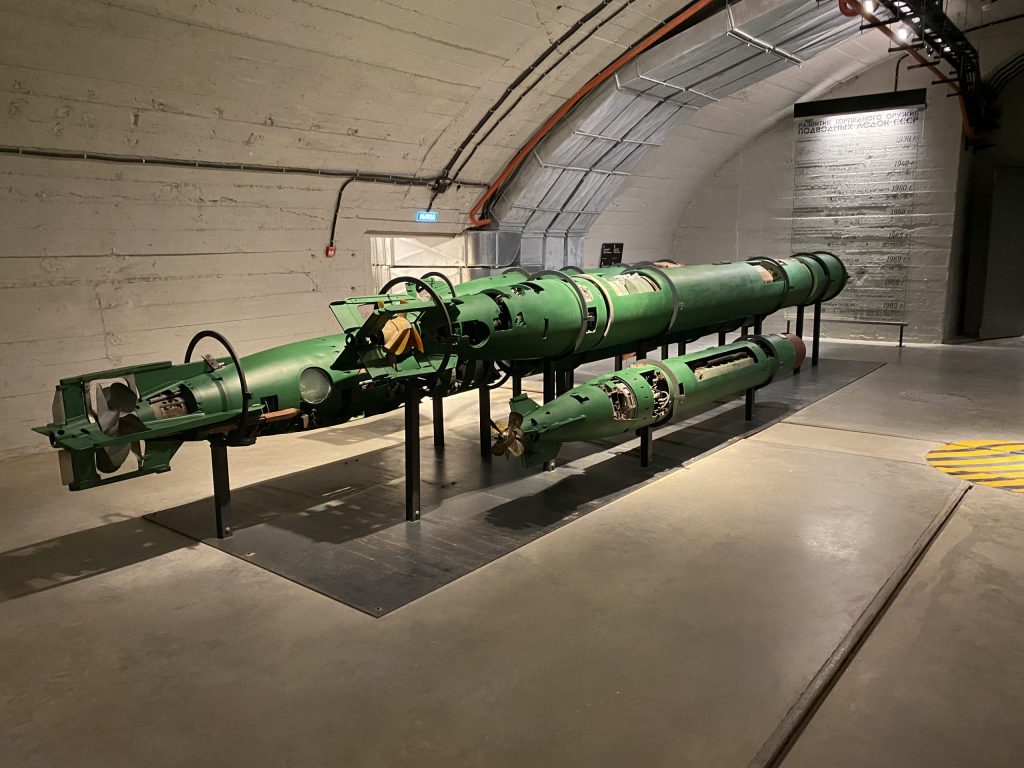
Nuclear weapons storage facility
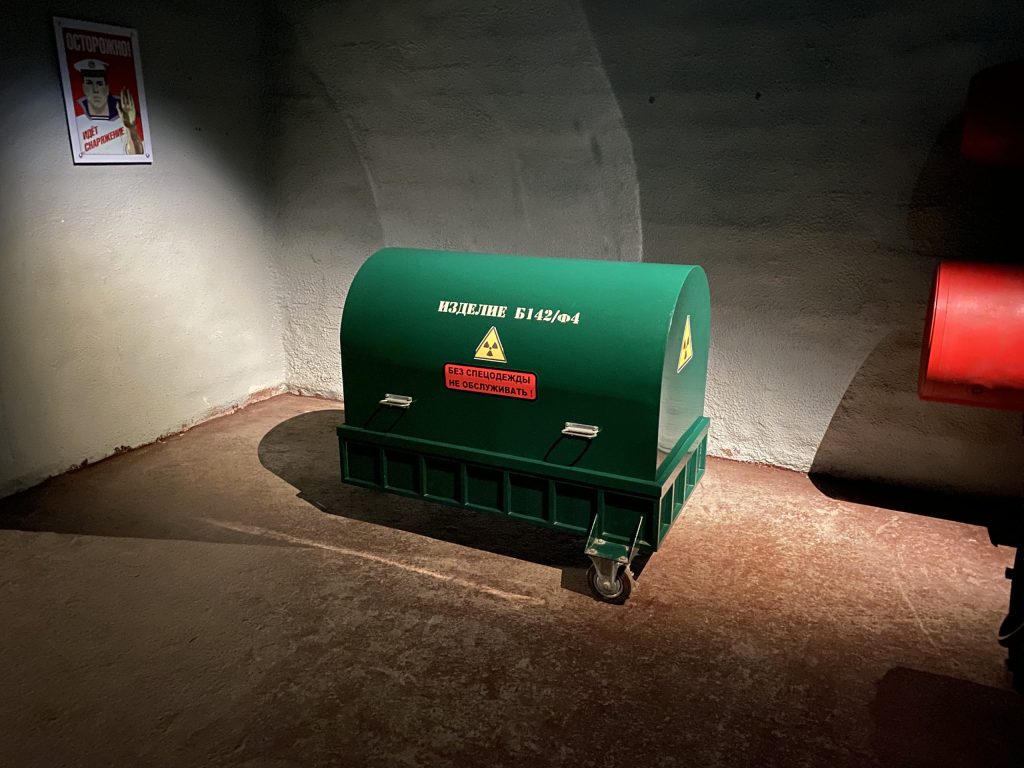
A metal storage casing for nuclear warheads
As I exited the Balaclava submarine base, Russian fighter jets flew over the base:
Never before had I visited a site at which nuclear weapons had been housed. Frankly, my visit to Balaclava caused me to feel a profound sense of foreboding about the world in which we live today – a world in which tensions between the world’s largest nuclear powers have never been higher.
A Conversation with a Russian Military Correspondent
Following my visit to Balaclava, I headed to Sevastopol and met with Sergei Pavlovich Gorbachev. Sergei is a retired Captain of Russia’s Black Sea Navy. He is now a military correspondent and Chairman of the Sevastopol Branch of the Union of Journalists of Russia:
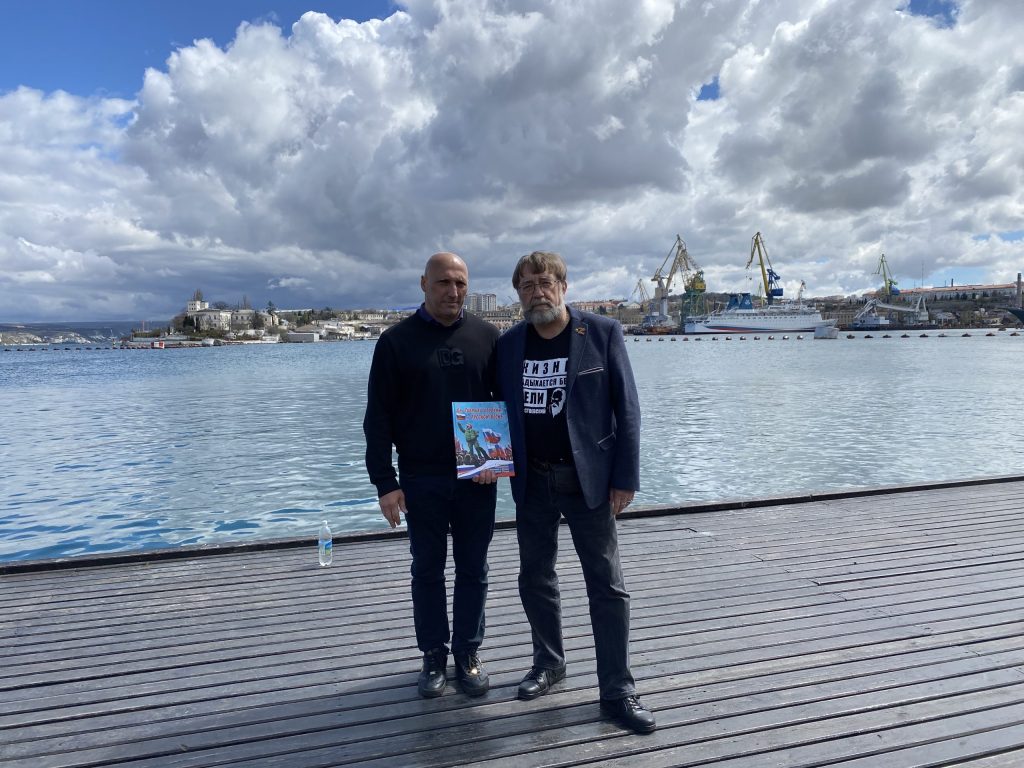
Sergei Gorbachev and Dimitri Lascaris, at the main port of Sevastopol
Several years ago, Sergei authored a book on the 2014 referendum that led to the merger of Crimea with Russia. He personally witnessed those events and can offer detailed recollections of this pivotal period in Russian-Ukrainian relations. In the photograph above, Sergei is holding a copy of his book, which he later gave to me as a parting gift.
Our first stop was the memorial to the Soviet soldiers who gave their lives in the defence of Sevastopol in World War II. During a brutal, eight-month siege of the city by German forces and their Romanian allies, over 200,000 soldiers of the U.S.S.R. lost their lives. Sevastopol itself was almost entirely obliterated:
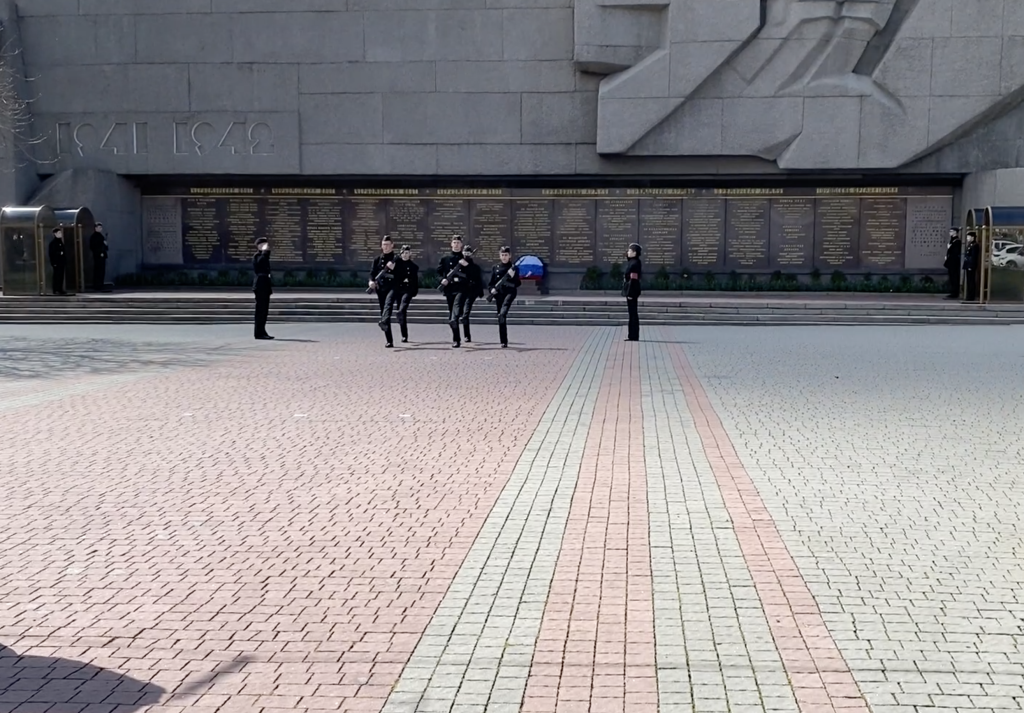
Memorial to the Soldiers who fell in the defence of Sevastopol in World War II
Next, Sergei and I stopped at a wharf in the main harbour, where local fisherman gather to catch grey mullet from the Black Sea:
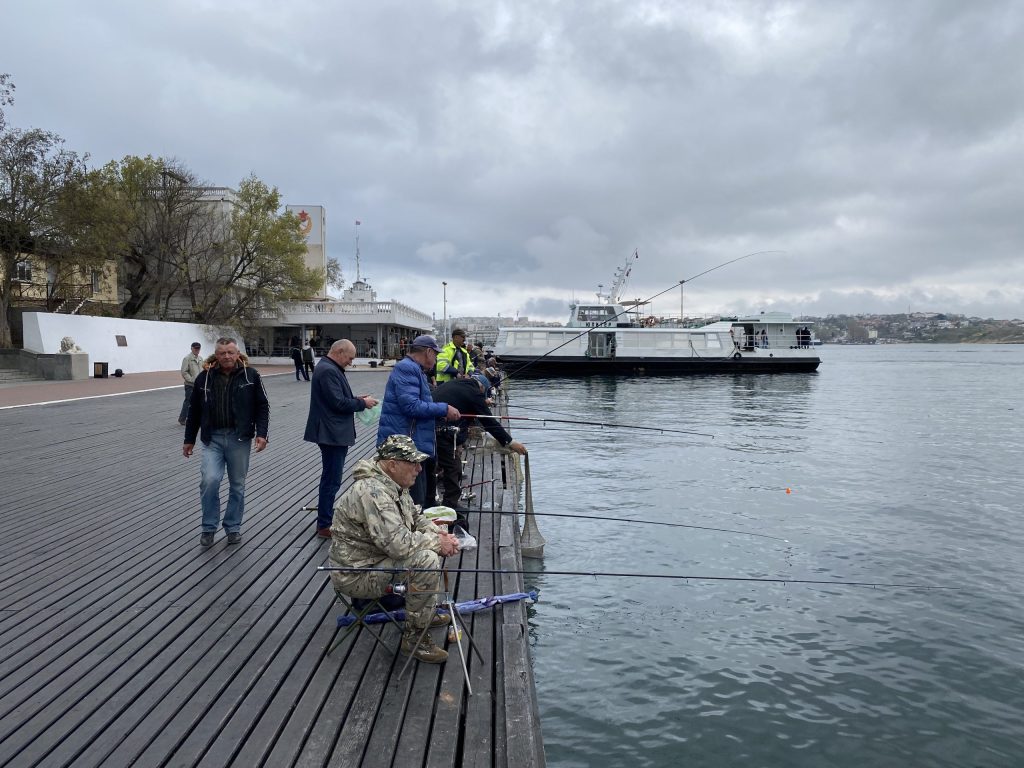
Fishermen’s wharf, main harbour, Sevastopol
Walking along the water’s edge, we could see numerous Russian naval vessels, including submarines:
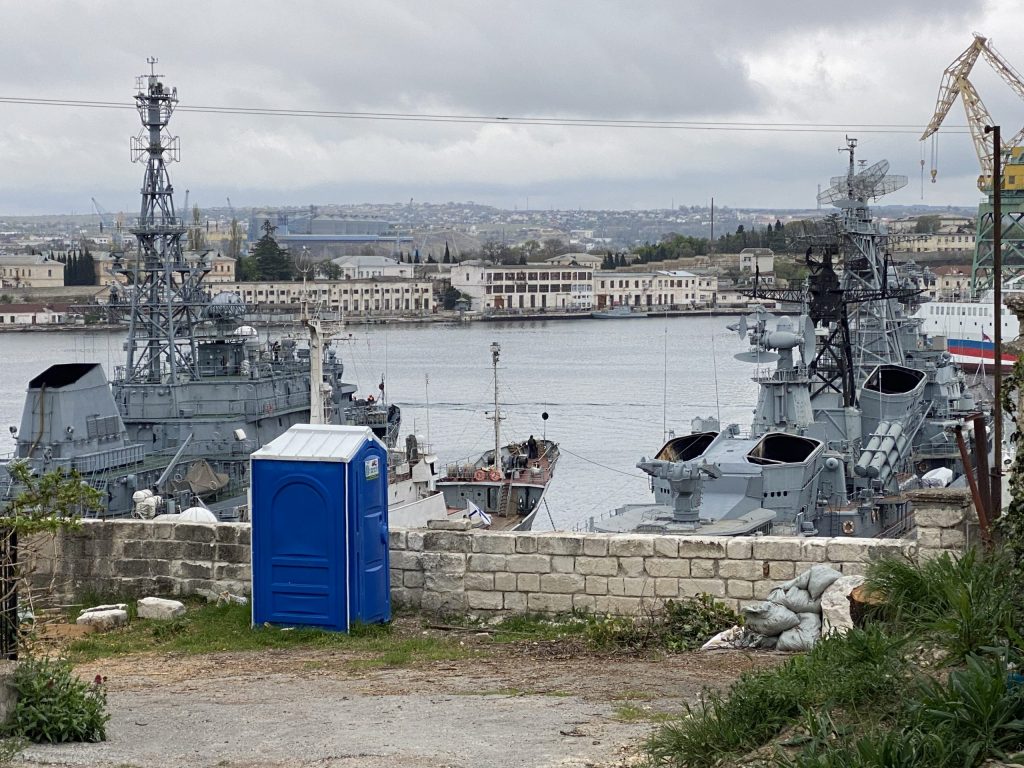
Naval vessels of Russia’s Black Sea Fleet, Sevastopol
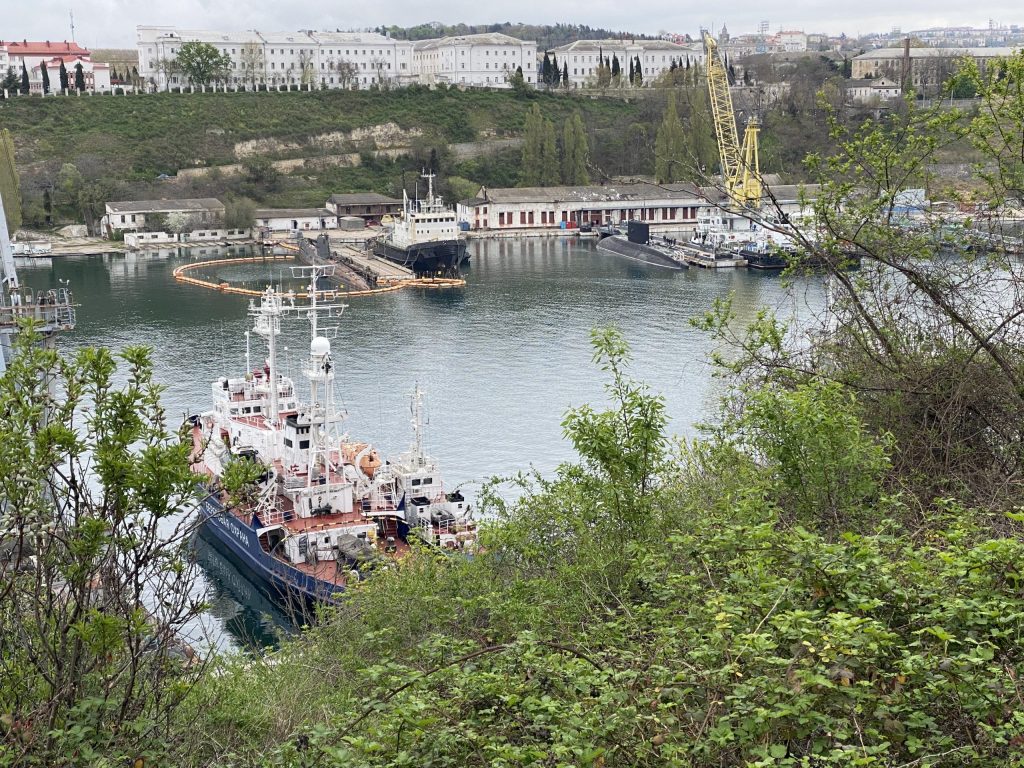
Submarines docked in the port of Sevastopol
During our stroll through central Sevastopol, Sergei asked me about the differences between Canada and the United States. I struggled to identify major distinctions. between the two countries. The most important distinction that occurred to me is that Canada’s health care system is primarily public whereas that of the United States is primarily for-profit. After reflecting upon my answer, Sergei said “for Russians, Canada and the United States are the same.”
Following our tour of Sevastopol’s main port, Sergei and I sat down for lunch with my translator, Tanya. Below, I have set forth an edited transcript of our conversation. I have edited our conversation for brevity, but have done my best to preserve the substance of Sergei’s answers.
My reporting of what Sergei said to me should not be taken as an endorsement or rejection of his views. I’m simply reporting his views neutrally. I leave it to you to evaluate Sergei’s perspective on the issues that I raised with him.
Dimitri: A criticism we hear of Russia in the West is that it suppresses dissent. Apparently, a law recently adopted by the Russian government criminalizes “fake news” regarding the “special military operation” (SMO) in Ukraine. As a Russian journalist, how do you respond to these criticisms? What is the state of press freedom in Russia today
Sergei: In Russia, journalists remain free to express their opinions for or against the SMO. A majority of journalists support Putin’s decision. Many who are against that decision left the country. Today, the Russian community has found consensus. In fact, a great majority of the population would like Russia to be more active, because they want to finish this war and to win it. I visited Zaporizhzhia region a few months ago and found that the main criticism of Russia’s military is that it is too slow to finish the operation. If people criticize Putin today, it’s because he didn’t intervene militarily after the Nazis burned people alive in Odessa in March 2014, and after the killing started in the Donbas. We lost time. More and more people were killed. Today, of course we have problems and there are people who are not happy. But the people who are not happy, it’s all connected to the sanctions and the aftermath of the sanctions. Also, some people are unhappy about the inconveniences imposed by military necessity – for example, they can’t fly from Moscow to Crimea and must take a 28-hour train ride to get there. People are unhappy about this, but you won’t find any protests here.
Dimitri: Polls have consistently shown majority support for President Putin. Before the SMO was launched, what, in your opinion, were the three most important reasons for this support?
Sergei: First, Russian people see the world based on a sense of fairness, consciousness and the true nature of things. In Russia we have a word for which there is no exact translation in English, but essentially it means “consciousness” or “in your heart, you know what is right and what is wrong”. The lives of people in the West are based on material things and the law. Russian people do respect the law, yes, but we’ve got a saying: according to the law, this is one thing, according to your consciousness, that’s another thing. And consciousness is given by God. And the law is very often based on money. And for Russians, money is ok but it’s not the most important thing. That’s why a lot of help comes to the front line from very ordinary people. Consciousness, truth and fairness, that’s number one. And people can see that Putin, he embodies all three notions. Before the SMO, there was a problem about what to do in 2024, when there will be another election. Will we re-elect Putin or choose another president? So people were doubting. But as of today, there is no doubt.
Second, Putin is a national leader. We can be proud of him. I have gone to seven press conferences given by Putin and I asked him questions at two of them. It’s a very special thing when you go to a press conference and watch him answer questions for three or four hours. He is very smart and has a great sense of humour. And when people look at him as the president of the country, they feel pride for their country.
Third, Putin symbolizes the imperial ideal of Russia. We are not talking about the colonies of empires or the expansion of the Russian Federation. Russia became an empire when more and more states were incorporated into its territory. These were territories around Russia’s border. Britain, France, Spain and Portugal, their expansion was all around the world far away from its territory. So our ‘imperial state of mind’ is different from theirs. We can see that it is better to live in a great country like Russia than in a banana republic like Guatemala. Putin has given realization to this ideal. We want to live in a great country. That is why people have united around this special military operation. People can see that Russia is being revived. On the other side, we hate fascism, and we will never stand for it on our soil.
Dimitri: From a practical perspective, do you believe that life has improved under President Putin?
Sergei: From a practical perspective, life has changed dramatically. People have stability, which they didn’t experience earlier. The living conditions under Yeltsin were completely shocking. There was no stability at all. People didn’t see any future.
Dimitri: In your opinion, how is this war likely to end? Do you believe that Ukraine must cease to be a sovereign state?
Sergei: It’s a very complicated question. My opinion about this changes from day to day. Today, a year after the SMO started, I believe that there should be no Ukraine at all. If Western Ukraine remains outside of Russia, that will be a mine that sooner or later will explode. Because what we see today is that the Bandera movement was not eliminated in the 1950s. It has been revived and is flourishing now. I don’t know how the map will look like. I think some part of Ukraine might become part of Poland. Maybe part of Hungary or Romania. But this project called “Ukraine” must be closed once and for all.
Dimitri: How do you feel about Odessa?
Sergei: It’s a Russian city. We think that, probably, Odessa is waiting for us.
Dimitri: Let’s talk about what most Russians see as the necessary preconditions to an end to this war. Let’s imagine that President Zelensky offered to Russia sovereignty over Crimea and the four oblasts that Russia has annexed, along with the “denazification” of Ukraine’s military, an end to the glorification of Bandera, and the abandonment of NATO membership for Ukraine. Do you think most Russians would accept that?
Sergei: First of all, Putin will never have a dialogue with Zelensky – and this is the fault of Zelensky. They could talk one year ago. But now, in reality, this is not a war between Putin and Zelensky. This is a war between Russia and the collective West. NATO should withdraw its forces to pre-1997 lines. NATO should dissolve, because we have no Warsaw Pact today. And there should be no more sanctions.
Dimitri: So if all of that happened, do you think that most Russians would accept a ceasefire?
Sergei: No, because Kyiv is a Russian city. The proper border is far beyond where Russia’s troops are now.
Dimitri: But wouldn’t accomplishing the military objectives you have outlined require another mobilization?
Sergei: No, as President Putin says, we haven’t yet started the war.
Dimitri: I understand that, after the referendum in 2014, the Ukrainian government retaliated against Crimea. Could you talk to us about that?
Sergei: Well, before 2014, Ukraine did nothing to reconstruct Sevastopol and Crimea. For example, the biggest enterprise in Sevastopol was a ship-building company which employed 16,000 people. But by the end of the period of Ukrainian rule, there were 300 workers left. Also the largest radio factory was located in Sevastopol. It was the largest in the Soviet Union. But when Ukraine came, it turned into an amusement arcade.
As for the quality of life, the roads were terrible. They never repaired them. They never built new housing for residents. So young people saw no prospects here, so they tried to move to Kyiv, to Russia, to bigger cities.
And starting from 2014, there was big development and actually a boom, despite all the sanctions, and despite all the problems that Poroshenko, the former Ukrainian President, created for Crimea.
It’s interesting, because although the Western countries never paid attention, we could call it ‘genocide’, what Ukraine was doing to us here.
For example, there was no electricity, blackouts for eight months. And at the same time Kyiv was saying ‘this is part of Ukraine, Ukrainians live there’, but they themselves created these problems. How is it possible that you consider these to be your own citizens but you cut off all their electricity?
Then there was the water. The northern Crimean channel stopped delivering water. This created problems not just for residents, but also for industries, including farmers. Northern Crimea has a very dry climate and water is essential there. For example, they were not able to grow rice any more, or vegetables, fruit, tomatoes. All the varieties which needed water, they ceased to be grown there. But the West didn’t care at all. There were artificial lakes where they bred fish. That couldn’t continue.
Dimitri: Western countries dispute the legality of the 2014 referendum that led to Russia’s annexation of Crimea. Their argument is that Ukraine was a sovereign state and that, even acknowledging the right to self-determination, the vote was held in illegitimate circumstances. There wasn’t enough time to debate. Also, they say that the presence of Russian forces in Crimea created a coercive environment for the vote. They also point out that people who would have preferred to keep Crimea in Ukraine fled Crimea. So why should the West treat the annexation as a lawful act?
Sergei: First of all, Crimea is Russia, from the very beginning, two hundred forty years ago. And look at Sevastopol. Nothing was here two hundred forty years ago. Russia came and the development started. And Crimea politically and administratively was part of Russia. And until 1954, Crimea was a part of Russia. Khrushchev illegally shifted Crimea from Russia to Ukraine. The decision of 1954 was not fair. Sevastopol back then had a special status. Both in the Russian empire and in the Soviet Union. In 1948, Stalin accepted Sevastopol as a separate administrative unit. This meant that Sevastopol would always be subordinate to Moscow. Sevastopol always remained directly subordinated to Moscow. It was never brought back to Ukraine. And even today, in Russia, there are three cities of federal importance: Moscow, St. Petersburg and Sevastopol.
After the transfer of Crimea to Ukraine, no one said anything because Ukraine and Russia were part of a single country, the U.S.S.R. After the breakup of the U.S.S.R., there was a very strong movement here to bring Crimea back to Russia, but Yeltsin wouldn’t hear it. So when the coup-d’état happened here in 2014, people realized that it’s a catastrophe for the residents of Crimea. And people here were fearing the worst, because a Ukrainian nationalist politician said “Crimea will be Ukrainian or it will be without people.”
The Ukrainian language was never taught in schools in Sevastopol. In other parts of Crimea it was taught, but not in Sevastopol.
So back in the 1990s, everyone was ready for Moscow to bring Crimea home, but Yeltsin was not ready. Thanks to Admiral Kasatonov, the Soviet navy was still stationed in Sevastopol and there were roughly 15,000 sailors. Those sailors stayed in Sevastopol even though in other parts of the Soviet Union that separated form the U.S.S.R. – for example, the Baltic states – the Russian sailors left when those countries separated. But in Sevastopol, the Russian sailors stayed. Why did they stay? They said “we will never leave Sevastopol, our native land.” And a majority of the civilians supported the sailors. That was 1991. And Kyiv couldn’t do anything.
And so there were negotiations until 1997 over the future of the Black Sea navy. Thereafter, both the Ukrainian and Russian navies were stationed here.
As of 2014, there were 22,000 Ukrainian military personnel in Crimea. And not one shot was fired in 2014. So out of 22,000 Ukrainian military personnel, 18,000 expressed their wish to serve in the Russian navy. So they shifted to the Russian side. The 4,000 soldiers who didn’t join the Russian navy left Crimea, mostly without their weapons. Almost all the major officers of the Ukrainian military who were then stationed in Crimea decided to stay in Crimea.
Finally, the referendum took place under Ukrainian law and in accordance with Ukrainian law. Journalists from mainstream media, like BBC and CNN, were present. There were 42 foreign journalists monitoring the referendum. It was all done legally based on the Ukrainian legal system.
-
[…] своих впечатлениях он уже написал в цикле материалов(https://dimitrilascaris.org/2023/04/29/three-days-in-sevastopol/). Надо отметить: его оценки и взгляды вполне […]




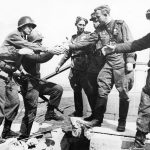
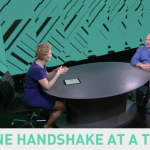
Remarkable interview, in which I think Sergei expresses something very important: an explanation of the Russian people, who “see the world based on a sense of fairness, consciousness and the true nature of things. In Russia we have a word for which there is no exact translation in English, but essentially it means “consciousness” or “in your heart, you know what is right and what is wrong”.”
Clearly this kind of thinking does not make sense in the West, especially amongst the Western leadership. When I think of Joe Biden, von der Leyen, Boris Johnson and Justin Trudeau, consciousness and an understanding of what is right and wrong does not match their behaviour or, one might say, their belief systems. This is what has led to the unconscionable acts carried out by those in charge of NATO over many decades, in spite of repeated, fair and perfectly reasonable warnings from the Russian government about what it sees as fair and reasonable and with which I agree. In saying this, I realize that I have my own bias, but it is not in favour of Russia, a country I have never visited, it is simply against these leaders who, in my opinion, have lied every inch of the way to February 2024 and beyond. This is what citizens of the west must learn and understand. They have been lied into what may be potentially a nuclear war.
Very interesting article and interview, Dimitri. Journalists like yourself and Eva Bartlett providing first hand observations from Crimea and the Donbas help cut through the veil of lies in the “western” mainstream media. Interesting seeing the Soviet underground Cold War submarine base is now restored as a museum. I was watching a show about it on the Smithsonian channel made before Crimea reunified with Russia and it had been completely stripped of virtually any metal or other items that could be sold as scrap by Ukraine. As Sergei says, after the debacle of the Yeltsin decade Putin brought stability and growing prosperity to Russia. No wonder he polls at over 70% while Trudeau and the Conservative leader de jour have to look up to see 40% support.
I actually donated to the Green Party for some years after Elizabeth May was the sole Canadian MP to vote against the bombing of Libya. But more recently she jumped on the Bandera bandwagon with Chrystia Freeland and Trudeau et al and I stopped sending money to support Nazi supporters. Ditto the NATO Democratic Party. I think you would have made a great Green Party leader if they were actually focused on the environment instead of on being “politically correct” in the “woke” swamp of “identity politics”.
Anyway, thanks for sharing your insights. I’m looking forward to reading about the rest of your travels in Russia. It’s been over 35 years since I was there in Soviet days and a lot has changed with the privatization (looting) of the national wealth in the ’90’s, both by the indigenous kleptocracy of former Stalinist bureaucrats and their “western” partners in crime. The war with NATO is smoking a lot of the kleptocrat rats out of their holes and unifying the country. Novorossia in particular is being radicalized. Nothing like fascist rockets and shells raining down on you to remind you what capitalism is all about.
Dimitri, could you please delete my comment. I didn’t proof it well and failed to express my thoughts. Thanks!
I have deleted it Flora. Peace, Dimitri
good to get what we are not hearing in our one sided pro imperialist US corporate media.
Thank you. It is wonderful when people can talk.
Thank u for providing a Russian perspective. It’s very much needed. As a counterweight to Nato friendly propaganda.
This comment is about your interview with the National Pest writer, as comments seem to be closed on that page.
Excellent debate! One additional point you might have made was Ukraine’s post-coup suppresion of the Russian language, removing it as an official language and downgrading it in education. Imagine if the the Canadian government suddenly anounced that French was no longer an official Canadian language.
One Pest point you confessed to being unqualified to counter was the allegation that Che Guevara was homophobic (he may also have added racist). This smear is thoroughly debunked at
https://www.youtube.com/watch?v=F5eFPgvhS60